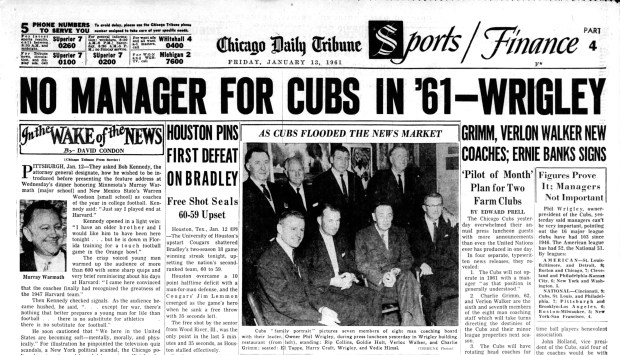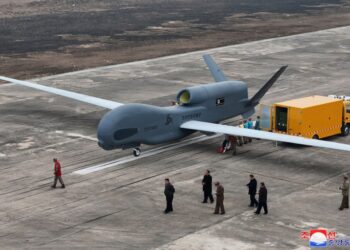Here’s a look back at what happened in the Chicago area on Jan. 12, according to the Tribune’s archives.
Is an important event missing from this date? Email us.
Weather records (from the National Weather Service, Chicago)
- High temperature: 62 degrees (2005)
- Low temperature: Minus 14 degrees (1918)
- Precipitation: 2.76 inches (1960)
- Snowfall: 7.4 inches (1908)

1961: “Now, about the word ‘manager,’” Chicago Cubs owner Philip K. Wrigley said as he addressed the team’s annual press luncheon. “I looked it up and the pure definition is ‘dictator.’” (Tribune editors balked at this explanation.)
With that, Wrigley announced a plan to have the team run by a revolving college of coaches. He produced a sign for the meeting that said, “Anyone who remains calm in the midst of all this confusion simply does not understand the situation.”
The team finished next-to-last in the standings in 1961 and 1962 before the experiment was abandoned.

1979: The city was walloped by a massive blizzard that dumped 20.3 inches of snow. At the time it was the second-largest snowfall in city history. Today, it’s the fourth-largest. It was not only the worst storm of that winter, the snowfall was also be a major factor in the city’s next mayoral election.
After observing the city by helicopter, Chicago Mayor Michael Bilandic ordered city snowplows to clear 250 school and Park District parking lots so residents could move their cars off the roads, but that effort was a failure. Many motorists couldn’t make it past double- and triple-parked cars on the still unplowed side streets. Garbage couldn’t be collected for at least 10 days. Mail was delivered late.
Instead of taking responsibility for the mishandling of the snow removal, Bilandic lashed out, saying police would be ticketing vehicles and ordering them towed if not removed from Chicago’s streets. He also said there would be “no exceptions” for sick, elderly or poor people who couldn’t move their cars. “If there are hardship cases, they can tell that to a judge. That’s what a judge is for,” he told reporters. Bilandic later apologized for his mishandling of the snow removal, but Chicago residents — voters — weren’t satisfied.

2000: The U.S. Supreme Court decision in Illinois v. Wardlow gave police broad authority to stop and question people who run at the sight of an officer.
The 5-4 ruling reversed an Illinois Supreme Court decision that held two Chicago officers were wrong to chase and stop William Wardlow when he ran away after seeing them cruising a street on the city’s West Side.
Want more vintage Chicago?
Subscribe to the free Vintage Chicago Tribune newsletter, join our Chicagoland history Facebook group, stay current with Today in Chicago History and follow us on Instagram for more from Chicago’s past.
Have an idea for Vintage Chicago Tribune? Share it with Kori Rumore and Marianne Mather at krumore@chicagotribune.com and mmather@chicagotribune.com







